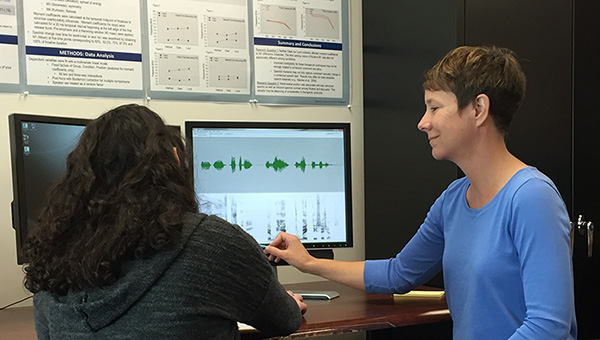2000 New Investigators Research Grant
Helping People Communicate Clearly

For many people with serious diseases like Parkinson’s or multiple sclerosis, losing their ability to communicate is among the hardest symptoms. Being able to communicate and connect with other people is key to our success and happiness. After a lifetime of communicating easily and naturally, imagine what it’s like to find yourself growing less and less able to speak and convey ideas.
Kris Tjaden, professor and director of the Motor Speech Disorders Laboratory in the Department of Communicative Disorders and Sciences at the University at Buffalo, is trying to help. She studies dysarthria in people who suffer from Parkinson’s and multiple sclerosis (MS). Dysarthria is a neurologically based communication disorder characterized by reduced speech intelligibility caused by impairment in the ability to execute the motor movements underlying speech.
Kris’ goal is to identify the aspects of speech production impairing these people’s intelligibility, and to identify innovative therapy techniques to improve their speech and ability to communicate.
“By directly comparing a number of commonly used treatment techniques, we’re trying to identify which techniques are most effective for which patients,” she says. In other words, she’s trying to eliminate the “trial and error” and “one-size-fits-most” approaches currently used when selecting a treatment technique for dysarthria.
Kris’ work mostly focuses on determining the potential benefits of treatment techniques centered on voluntarily changing speech intensity, rate, or clarity—and ways to optimize these techniques.
She begins by bringing into her lab people with Parkinson’s, who tend to be in their 60s, and those with MS, who tend to be in their 40s, to do a “one-time stimulability session,” instructing participants to modify their speech’s intensity, rate, or clarity. She then makes speech acoustic measures of rate, articulation, and voice pitch using specialized computer software.
By comparing these speech measures for speakers with Parkinson’s or MS to those of age and sex-matched healthy controls, Kris can determine the manner in which these diseases affect articulatory precision, voice pitch, rate, and other speech production characteristics. And by comparing how different therapeutic techniques affect those speech measures, she can help identify the speech production variables that are improved (or not) by different treatment techniques—homing in on which treatments are most effective.
The people with MS or Parkinson’s that Kris studies tend to be mildly to moderately impaired. Maintaining employment and an active social life are top priorities. But that’s hard because while their speech intelligibility can be near normal in quiet, calm environments, it dramatically decreases when the communication environment is less than ideal. Learning more about speech therapy techniques that maximize intelligibility in difficult communication environments is important for helping these people striving to communicate fully participate in everyday life.
Some of the first support for Kris’ innovative research came from an ASHFoundation New Investigators Research Grant in 2000. This preliminary research contributed to her current work and equipped her to achieve an R01 grant from the National Institutes of Health.
“I was extremely fortunate to receive ASHFoundation funding so early in my academic-research career,” Kris notes. “I am very grateful to the ASHFoundation.” She notes ASHF’s role in providing early support to promising innovators: “ASHFoundation resources are critical in today’s funding climate to allow researchers to collect pilot data required for a larger, competitive federal application.
Kris Tjaden’s research and career show how ASHFoundation’s investments in promising innovators in the communication sciences are paying off. Supporting early-career speech-language and hearing professionals is the best way to spark innovative, forward-thinking ideas for the field. Kris’ research has the promise to change the way her fellow professionals work, and change the lives of people with these disorders striving to communicate and connect.
View More Recipient Spotlights